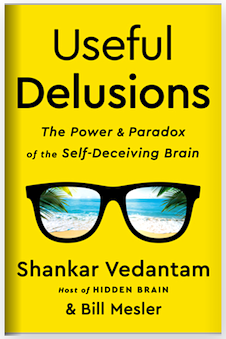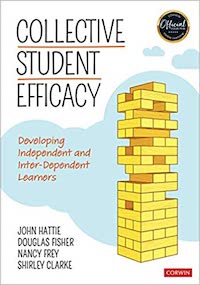By Cathy Gassenheimer
Executive Vice President
Alabama Best Practices Center
You are delusional and so am I. And sometimes delusion can be a good thing!
That’s the message shared by prominent science journalist and podcaster Shankar Vedantam in his new book Useful Delusions: The Power Paradox of the Self-Deceiving Brain (co-authored with Bill Mesler).
If you follow my blogging or participate in our ABPC professional networks, you won’t be surprised to hear that I drew a connection between Vedantam’s conclusions and researcher John Hattie’s top classroom influencers. Read on to see why I think “useful delusions” could make those influencers have even more daily impact in our schools.
Delusions Are Always With Us
 Delusions are part of every human’s life, ranging from embellishing praise on a friend as an act of kindness to more insidious forms of delusion, like fully embracing unlikely conspiracy theories.
Delusions are part of every human’s life, ranging from embellishing praise on a friend as an act of kindness to more insidious forms of delusion, like fully embracing unlikely conspiracy theories.
Vedantum suggests that delusions are sometimes necessary to give us hope:
“We need hope to function, but the world gives us endless reasons not to be hopeful…that’s why, in every culture around the world, people reach for beliefs that tell them their lives have purpose and meaning.” (p. xix).
Examples of Delusions for Good
While the book does capture stories of con artists and sham social media, it is also full of stories about deceptions for good. For example:
- Good will and politeness are essential for the successful function of teams and organizations. Think of times you’ve bitten your tongue instead of blurting out what you really feel. And treating a team member with respect can help build rapport and trust.
- Parenting is delusional. You don’t want to crush your child’s belief in Santa Claus or the tooth fairy too early. And while you generally don’t want your children to lie, you still teach to say nice things to their peers, even when they might be exaggerating a little.
- Benevolent self-deception can be life-extending. Vedantam documented medical studies that found cancer patients who were optimistic lived longer than those who were more fatalistic.
- Little rituals like sitting in a certain chair when watching your favorite sports team or preparing a “lucky” meal on New Years Day are delusional behaviors. You know it’s really not going to change the outcome of the game (or the year), but you do it anyway. Surprisingly, there’s a benefit to this delusional behavior. Research shows that repetitive behavior can be calming and lessen anxiety!
So, the challenge is to “be delusional” to be kind – and perhaps to hold ourselves to higher standards of civility – but resist the downside of delusion — those ultra-negative, fear-inducing spaces where we might find ourselves falling through Alice’s proverbial rabbit hole.
There are many more ideas and insights contained in Useful Delusions, and I heartily recommend reading it. For a preview, you can watch this interview of Shankar Vedantam by Dr. Dacher Kelton, a professor at the University of California-Berkley and the director of the Good Science Center.
Useful Delusions and Hattie’s Research
As I read Vedantam’s book, I kept making connections to educational practice, particularly to the meta-findings by John Hattie. Collective teacher efficacy and student self-reported grades are two of the top practices Hattie has identified as actions likely to dramatically improve student learning.
Teachers who embrace collective efficacy believe that – working together – they have the knowledge, skills, and persistence needed to successfully reach all students. Initially, to grow a sense of collective efficacy some teachers may need to “delude” themselves and agree to accept research they find difficult to believe. Exercising good will and support for the team, they embrace the findings that show student learning soars when teachers commit to high expectations, plan lessons jointly, analyze data, and target students in need of extra help.
When teachers see that their hard work is paying dividends, they become believers, and their willingness to “pretend to believe” transforms into more effective practices with better long-term results for students as they grow their own efficacy.

The same is true for student self-reported grades (which Hattie now refers to as student expectations). Here’s what Hattie discovered through his meta-analyses: Students are very accurate predictors of their grades and success. Helping students set realistic goals they believe they can achieve puts them in the driver’s seat. Reaching those goals can begin a cycle of achievement, where both the teacher and students set higher and higher expectations for success.
Sadly, many students don’t believe they can achieve at high levels. It’s then up to the teacher to help shift that belief using high expectations, focused support, and expressions of confidence. In a real sense, the teacher is creating a “delusion for good” by convincing students they can do more.
We Need to Believe in Ourselves and Our Students
It’s been a tough two years, and now, more than ever, we need to believe that we have it within our reach to successfully teach every child and to help them “leap forward” as we all recover from the pandemic. Instilling these high expectations—for students, ourselves and our colleagues – however delusional they may feel at the time, can put us back on the road to success for all.


0 Comments on "How “Useful Delusions” Might Help Teachers and Students Be More Successful"